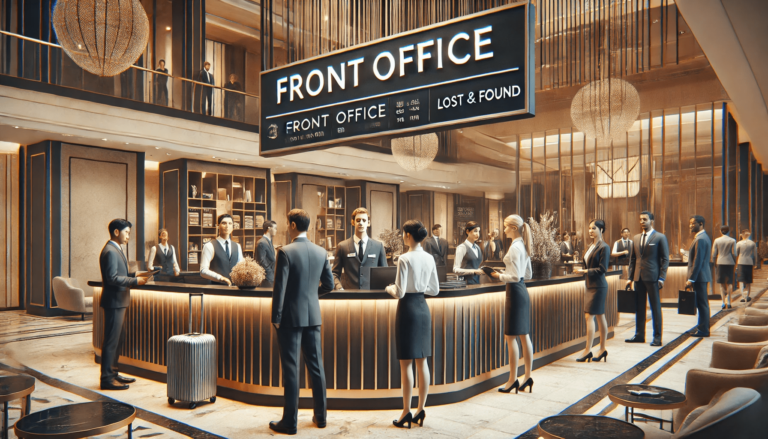The role of a Front Office Manager is pivotal in the hospitality industry. Often serving as the face of the hotel, the front office manager is responsible for ensuring that guests have a pleasant and memorable stay. This involves overseeing the day-to-day operations of the front desk, coordinating with other departments, and managing guest relations. In this article, we will explore the comprehensive duties and responsibilities of a Front Office Manager, including their role in handling lost and found items and how tools like Deliverback can help streamline this process.
Key Duties and Responsibilities of a Front Office Manager
- Supervising Front Desk Operations
A primary duty of the Front Office Manager is to oversee the front desk operations. This includes managing the staff responsible for guest check-ins and check-outs, handling reservations, and addressing guest inquiries. The manager must ensure that the front desk team is well-trained and capable of delivering exceptional customer service, as this directly impacts guest satisfaction and the hotel’s reputation.
Key aspects of supervising front desk operations include:
- Training en ontwikkeling: Providing ongoing training for front desk staff to enhance their skills in customer service, problem-solving, and the use of hotel management software.
- Staff Scheduling: Creating and managing work schedules to ensure that the front desk is adequately staffed at all times, particularly during peak hours.
- Performance Monitoring: Evaluating the performance of front desk staff and providing feedback or additional training as needed.
- Guest Relations Management
De Front Office Manager plays a crucial role in managing guest relations. This involves handling guest complaints, ensuring that guest requests are fulfilled promptly, and making sure that all guests feel valued and respected during their stay.
Key components of guest relations management include:
- Complaint Resolution: Addressing guest complaints in a timely and professional manner. This may involve coordinating with other departments, such as housekeeping or maintenance, to resolve issues.
- Personalized Service: Ensuring that the front desk team provides personalized service to guests, such as recognizing returning guests and accommodating special requests.
- Feedback Collection: Gathering feedback from guests through surveys or direct communication to identify areas for improvement.
- Coordinating with Other Departments
A successful Front Office Manager must work closely with other departments within the hotel to ensure seamless operations. This includes coordinating with housekeeping, maintenance, food and beverage, and other departments to meet guest needs and maintain a high standard of service.
Examples of interdepartmental coordination include:
- Housekeeping Coordination: Communicating with the housekeeping team to ensure rooms are cleaned and ready for new arrivals and that guest requests for additional amenities are fulfilled.
- Maintenance Requests: Working with the maintenance department to promptly address any repairs or issues reported by guests or staff.
- Event Planning and Coordination: Collaborating with the events team to ensure smooth execution of conferences, weddings, and other events hosted at the hotel.
- Managing Reservations and Room Assignments
One of the critical responsibilities of a Front Office Manager is overseeing the reservation process and managing room assignments. This involves ensuring that reservations are handled efficiently and that guests are assigned rooms according to their preferences and availability.
Key tasks related to managing reservations and room assignments include:
- Reservation Management: Overseeing the reservation system to ensure accuracy and efficiency in booking processes.
- Room Allocation: Coordinating room assignments to maximize occupancy rates while accommodating guest preferences and special requests.
- Group Bookings: Managing group bookings and coordinating with other departments to ensure that group needs are met.
- Implementing Standard Operating Procedures (SOPs)
To maintain a high level of service and consistency in operations, the Front Office Manager is responsible for developing and implementing standard operating procedures (SOPs) for the front office. These SOPs cover various aspects of front desk operations, including check-in/check-out procedures, guest communication protocols, and safety measures.
Components of SOP implementation include:
- Development and Revision: Creating SOPs that align with the hotel’s standards and revising them as needed to reflect changes in operations or guest expectations.
- Staff Training: Training front desk staff on SOPs to ensure they understand and adhere to the procedures.
- Monitoring Compliance: Regularly monitoring front desk operations to ensure compliance with SOPs and making adjustments as necessary.
- Handling Financial Transactions and Reporting
De Front Office Manager is also responsible for overseeing financial transactions at the front desk, such as guest payments, refunds, and currency exchange. This includes ensuring accuracy in financial records and adhering to the hotel’s financial policies and procedures.
Responsibilities related to financial management include:
- Payment Processing: Ensuring that all guest payments are processed accurately and securely, whether through credit cards, cash, or other forms of payment.
- Cash Handling: Managing the front desk cash drawer, including cashing out at the end of shifts and ensuring that funds are accounted for.
- Financial Reporting: Preparing financial reports related to front desk operations, such as daily revenue summaries and end-of-day reports.
- Managing Lost and Found Items
Handling lost and found items is an essential duty of the Front Office Manager. Lost items must be logged, stored securely, and returned to their owners promptly. Efficient management of lost and found not only enhances guest satisfaction but also upholds the hotel’s reputation for excellent service.
Key steps in managing lost and found include:
- Logging and Inventory: Maintaining a detailed log of all lost and found items, including descriptions, dates, and locations where items were found.
- Secure Storage: Ensuring that all lost items are stored in a secure location to prevent loss or theft.
- Guest Communication: Reaching out to guests who may have lost items and coordinating the return of these items in a timely manner.
- Enhancing Lost and Found Management with Deliverback
Deliverback is a specialized service that helps hotels manage their lost and found operations more efficiently. By integrating Deliverback into the hotel’s existing systems, the Front Office Manager can streamline the process of logging, storing, and returning lost items, ensuring a smoother operation and higher guest satisfaction.
Terugleveren offers several benefits:
- Automated Logging: Simplifies the process of logging lost items, reducing the workload on front desk staff.
- Efficient Guest Communication: Automatically notifies guests about lost items and coordinates the return process, saving time and improving guest satisfaction.
- Enhanced Security: Provides a secure platform for managing lost and found items, reducing the risk of loss or theft.
- Improved Reputation: By efficiently managing lost items, hotels can enhance their reputation for excellent service and increase guest loyalty.
9. Ensuring Safety and Security
Safety and security are paramount in the hospitality industry. The Front Office Manager is responsible for implementing and enforcing safety protocols to protect guests, staff, and property. This includes emergency response planning, security training for staff, and monitoring safety systems.
Essential safety and security responsibilities include:
- Emergency Planning: Developing and maintaining emergency response plans for various scenarios, such as fires, natural disasters, or medical emergencies.
- Security Training: Providing training to front desk staff on safety procedures, including how to handle suspicious activity or security breaches.
- Monitoring and Surveillance: Overseeing the use of surveillance systems and ensuring that security measures are in place to protect guests and property.
10. Maintaining Hotel Policies and Procedures
De Front Office Manager is responsible for ensuring that all front desk operations adhere to the hotel’s policies and procedures. This includes enforcing standards for guest conduct, staff behavior, and operational practices.
Key aspects of maintaining hotel policies and procedures include:
- Policy Enforcement: Ensuring that front desk staff understand and adhere to the hotel’s policies and procedures.
- Guest Conduct: Addressing any issues related to guest conduct, such as noise complaints or violations of hotel rules.
- Staff Compliance: Monitoring front desk staff to ensure compliance with operational practices and providing corrective action if necessary.
11. Technology and Innovation Management
In today’s digital age, the Front Office Manager must also stay abreast of technological advancements and innovations that can enhance hotel operations. This includes implementing new software, tools, and systems that improve efficiency and guest satisfaction.
Responsibilities related to technology and innovation include:
- System Implementation: Overseeing the implementation of new technology systems, such as Property Management Systems (PMS), customer relationship management (CRM) tools, and automated check-in kiosks.
- Staff Training: Training front desk staff on the use of new technologies to ensure smooth integration into daily operations.
- Innovation Adoption: Identifying and adopting new tools and technologies that can enhance the guest experience and improve operational efficiency.
Conclusie
The role of a Front Office Manager is multifaceted, requiring a combination of leadership, customer service, and operational management skills. By effectively managing front desk operations, coordinating with other departments, handling lost and found items, and leveraging tools like Deliverback, the front office manager ensures that guests have a positive and memorable stay. With a focus on continuous improvement, safety, and innovation, the front office manager plays a crucial role in maintaining the hotel’s reputation for excellence and achieving high levels of guest satisfaction.
By mastering these duties and responsibilities, a Front Office Manager can create a welcoming and efficient environment that not only meets but exceeds guest expectations, fostering loyalty and enhancing the overall success of the hotel.


